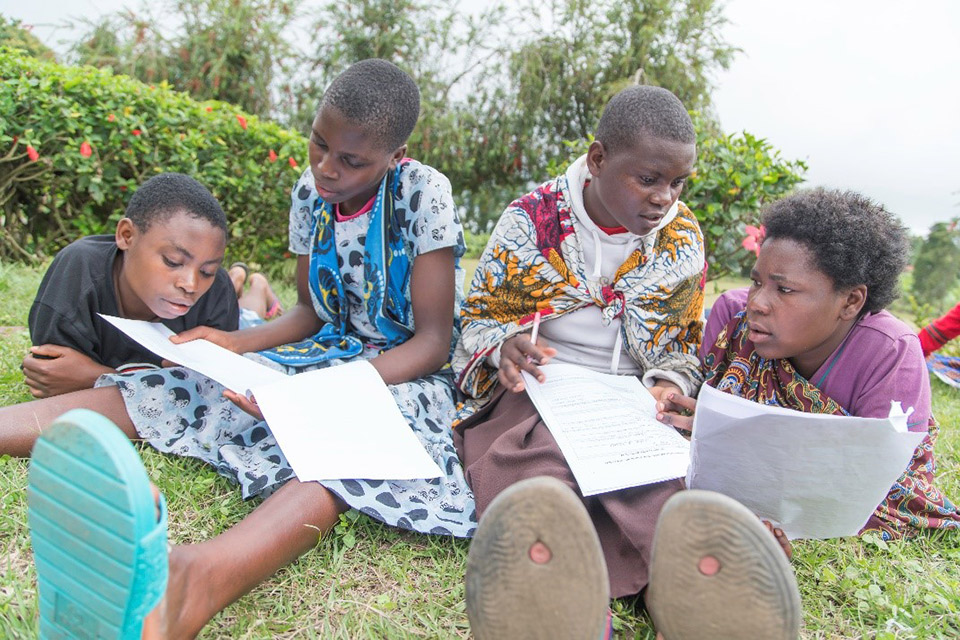Cash Plus
A better chance in life for the most vulnerable adolescent girls and boys in Tanzania

A group of Cash Plus livelihood and health training course participants discuss an assignment in Ikama Village in the Rungwe District of Tanzania. ©UNICEF Tanzania/2018
The Problem
Tanzania has a young population. The country is home to 12 million adolescents (10-19 years), which is expected to grow to 30 million by 2050. Adolescents in Tanzania face many barriers to safe transitions to adulthood, including health-related risks, barriers to schooling, and limited their livelihood opportunities. Poverty is a key driver of poor educational opportunities and health-related risks, including early pregnancy, gender-based violence and sexually transmitted infections such as HIV. Findings from a 2018 UNICEF baseline study conducted jointly with the Government of Tanzania show that many adolescents from poor households live in particularly vulnerable circumstances, with one in three not living with a parent or guardian, and half of those being double orphans. About two in three households are female headed, with household heads approximately 60 years old on average. Adolescents live in labour-constrained households with fewer working-age adults when compared to similarly poor and rural households in Tanzania.
To respond to the urgent needs of these girls and boys, social protection has been recognized as a leading tool in the fight against poverty and has also shown potential in facilitating safe transitions to adulthood. However, global evidence suggests that providing cash transfers alone to families is not a sufficient solution to address risks faced by adolescents. A tailor-made and locally relevant package is required to ensure that adolescents from poor households are not left behind in the development agenda.
The Response
Motivated by the largest ever adolescent population in Tanzania entering their economically productive years, along with the idea that social cash transfers can be leveraged with complementary programming, the Tanzania Social Action Fund (TASAF) with support from UNICEF, Irish Aid and the Oak Foundation is implementing a programme developed for adolescent girls and boys who are from the poorest households in Tanzania. The Cash Plus programme jointly addresses livelihoods skills and education on HIV, Sexual and Reproductive Health (SRH) and gender equity, also facilitating linkages to adolescent responsive SRH services. This approach recognizes that social cash transfers alone are not sufficient, that adolescents need a combination of social, health and financial assets to safely transition to adulthood. The programme design was informed by a consultative process whereby government, UN, development partners, and researchers came together to identify salient needs and vulnerabilities of Tanzanian adolescents and best practices to support them. The Cash Plus programme is a unique, multi-sectoral, government-implemented intervention targeted to vulnerable adolescents in impoverished households. The Programme is operated within the Government of the Republic of Tanzania’s Productive Social Safety Net (PSSN). The “Plus” consists of:
- Integrated training in livelihood, HIV, sexual and reproductive health, gender equity and violence prevention
- Mentoring and small grants - adolescents are accompanied by an adult mentor to access vocational training, benefit from a small grant to start an economic activity, and discuss SRH and HIV related challenges in a safe and confidential environment
- Linkages to improved adolescent-responsive health services.
The programme is accompanied by a randomized control trial to assess the impact of the intervention, inform national scale up plans and generate global evidence.
Success Factors/Lessons Learned
- Building on the existing government PSSN programme which delivers cash transfers to 1.1 million poor families and implementing the Cash Plus through the government structures maximizes possible opportunities for future scale up.
- Combining sector interventions into a ‘Plus package’ for this vulnerable adolescent’s population addressing the particular needs of both girls and boys. It also speaks to several SDGs, including No Poverty, Good Health and Well-being, Quality Education and Gender Equality. The synergistic nature of the Cash Plus interventions has thus the potential to function as an accelerator to advance adolescents’ health and livelihoods simultaneously.
- A strong focus on expansion of opportunities for adolescents in their communities, especially if they are from poor households. Grounding the programme from the onset in the local context and identifying community based adult mentors and local opportunities has shown to be critical that adolescents receive continued support in applying new knowledge and skills.
- A robust partnership with the Government of Tanzania, Irish government, UNICEF, Oak Foundation and researchers is critical to develop, implement and evaluate this multi sector Cash Plus programme. This partnership has proven to be grounded in the common vision to leave no adolescent girls or boys behind.
- The design of the Cash Plus programme, brokering new relationships with global actors and advocating for domestic resources can bring additional funding for scale up to Tanzania. One major success in this regard has been a commitment by the Global Fund to support the scale up of the programme with a grant $16 million over the period 2018-2020.
What Next?
- The Cash Plus implementation and evaluation in the intervention and control sites are set to be completed by 2019.
- Evaluation findings will inform the strategy for scale up.
- Sustainable financing options and new aid modalities will continue to be explored.
- Continuous learning and sharing of ‘what works’ in similar type of programmes, at the national and global levels will be facilitated by the Government and partners.

